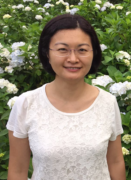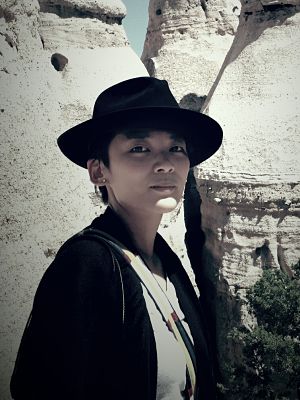Who Cut the Tribe in Half
— The sea is so blue, the valley so deep. That’s why sadness goes far and wide. But you must stare it in the eye. Only by braving it will you outgrow the child and be an adult. To the children at Gangkou Elementary School, Hualien County, Taiwan.
Ina often calls my name on this side
and asks me to buy betel nuts from Pilaw the grocer on the other side.
An impolite mountain road cuts through the entrance of my house.
It has a number like my seat number at school.
Its number is eleven. Mine is nine.
Last year, on the way to my house to play,
Kacaw’s dog was hit on the road and died.
Ina said,
“After all, it was a doggie, not a person.”
Since then, a new curved mirror appeared
at the intersection of our neighborhood—
facing Pilaw’s betel nut counter.
We thought Pilaw loved looking at herself in the mirror
and even laughed at her in secret. But
only us the children would go up to the mirror,
watch our faces change shape, grow big, turn funny.
Ina said the road hadn’t existed before;
the tribe had been a single whole, boundless to run.
The beach used to be our path.
Grandpa walked along it to preach, all the way to Shuilian Village.
The sea waves recorded his footprints and kept him from drowning.
Now, the mountain road brings in lots of city folks
and takes away our betel nuts and whitebait.
The beach has slowly disappeared
in a swamp of sticky rice dumplings
where Kacaw and I would climb up,
play hide and seek, and catch kalang.
As our road enters the mountains,
it goes across two peaks and reaches my house.
On the opposite side are a grocery store and a church.
Many elders, thinking it’s no different from the past,
cross the road as if taking a stroll.
The cars would roll down their window,
shouting ma la sun in our face.
But Grandpa won’t go to a padawsi in a suit.
He’s going to the church over that ………… side.
The road isn’t wide, only cars are fast.
So we form a line to see God.
是誰把部落切成兩半?
——海是那樣藍,山谷是那樣深,所以更會有遍地傷心。但你/妳必須要去逼視,唯有如此,才能從一個小孩長成為一個男人/女人。獻給港口國小的孩子們。
ina 常常在這邊呼喊我的名字
我去那邊的雜貨店跟Pilaw買一包檳榔
一條沒有禮貌的山路開過我家大門
它跟我一樣有座號
它是11號 我是9號
去年,Kacaw的狗來找我玩時
被撞死在路上
ina 說:
「只是小狗沒關係,還好不是人。」
從此以後,四鄰的路口多了一根
凹凹凸凸的鏡子——
對著Pilaw的檳榔攤照
我們以為是Pilaw愛照鏡子
還躲起來偷偷笑她 但其實
我們小孩子才會一直跑到鏡子前面
看我們的臉變形變大變得很好笑
ina 說以前才沒有這條馬路
整個部落都是連在一起 可以跑來跑去
我們的路走在沙灘上
阿公沿著沙灘到水璉去傳教
海浪會記得他的腳印 不會把他淹沒
現在山路載來了好多都市的人
也載走我們的檳榔、魩仔魚
海灘就漸漸消失
浮了好多肉粽上來
我跟Kacaw 都會爬在上面玩躲貓貓
還可以抓 kalang1
我們的路走進了山裏
沿著路穿過兩座山就會來到我家門口
路的另一邊有雜貨店和教堂
很多老人到現在還以為是從前
過馬路就像在散步
車子就會搖下車窗來罵人
說我們馬拉桑了啦
但是阿公才不會穿西裝把導係2
他是要去那……一邊的教堂
馬路沒有很寬只是車很快
所以我們都要排隊見上帝
- 阿美語「螃蟹」之意。
- padawsi,阿美族人在家庭、朋友團聚的場合,喝酒、唱歌、聊天的行為。
Translator’s Note
Among Taiwan’s predominantly Han Chinese population, about two percent, or 550,000, are aborigines from more than twenty tribes. The largest of these tribes is the Amis, whose life and culture are explored in “Who Cut the Tribe in Half?”
Albeit in many ways assimilated, the Amis preserve their traditions in everyday life. Yet they face increasing challenges brought by the dominance of the Han Chinese majority and the impact of land development, as depicted in “Who Cut the Tribe in Half?” Through the innocent voice of the anonymous child speaker, the poem describes a literal division of the tribe by external forces. Jade G. Huang dedicates the poem to the students at Gangkou Elementary School, where she taught in 2012. The school has a very small student population totaling thirty to forty per year, and almost all students are from the Amis tribe. In the poem, kalang means “crab” in the Amis language. Ma la sun is a Sinicized term for “drunk,” originally from the Amis. Padawsi means a party or get-together among families or friends.
I first met Huang at a poetry festival in Taiwan in summer 2016. She read a poem about a fatal accident of a boy studying at Gangkou. The deep feelings that Huang, a Han Chinese teacher, had for her Amis student, expressed subtly in that poem, were part of her core concern for the Amis’ future. Huang’s poems engage readers with questions that ultimately pertain to pangcha, an Amis term by which the tribe address themselves, meaning “human being.”


 Jade G. Huang lives in Hualien, Taiwan. She recently obtained a Master’s degree at the Graduate Institute for Social Research and Cultural Studies at Taiwan’s National Chiao Tung University. Her thesis is titled “The Reproduction of Hualien Urban Space Under Capitalism.” Huang’s first poetry book, Who Cut the Tribe in Half?, received the inaugural Yang Mu Poetry Award in 2014. The poem “Who Cut the Tribe in Half?” won the first prize of the Lin Rongsan Literary Awards in Poetry in 2012. Huang was a Santa Fe Art Institute Fellow in 2015 and gave
Jade G. Huang lives in Hualien, Taiwan. She recently obtained a Master’s degree at the Graduate Institute for Social Research and Cultural Studies at Taiwan’s National Chiao Tung University. Her thesis is titled “The Reproduction of Hualien Urban Space Under Capitalism.” Huang’s first poetry book, Who Cut the Tribe in Half?, received the inaugural Yang Mu Poetry Award in 2014. The poem “Who Cut the Tribe in Half?” won the first prize of the Lin Rongsan Literary Awards in Poetry in 2012. Huang was a Santa Fe Art Institute Fellow in 2015 and gave 


